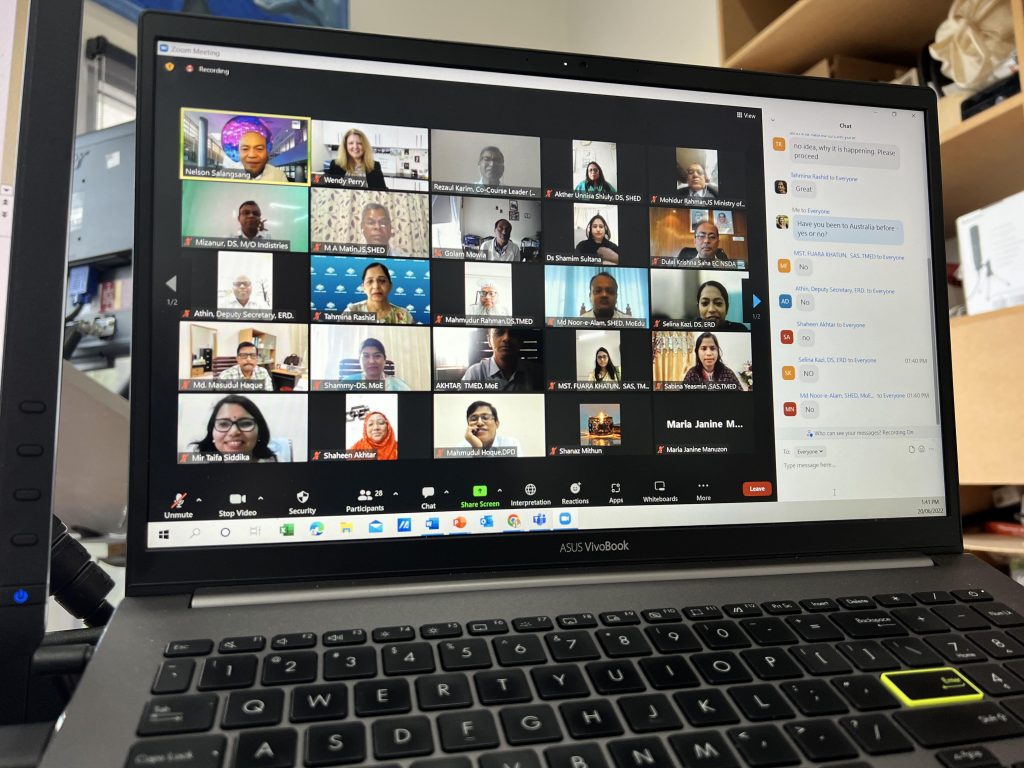Monday saw a very positive, optimistic & encouraging start to the Australia Awards short course on Strengthening Leadership & Management in Bangladesh’s TVET Sector with the top 20 VET/TVET (Vocational Education & Training) leaders involved. This group includes experts from the Ministry of Education, Prime Ministers Office, Ministry of Finance, Ministry of Labour & Employment, Ministry of Industries #bangladesh.
Over 3 days, with the opening program participants introduced themselves, got to know each other and the team, heard about the vision for a demand drive and high quality TVET (VET) system in Bangladesh, and saw an overview of the Australian VET system at this time.
Interviews with participants highlighted the interesting work they are undertaking, leading policy, programs, finances, quality assurance and industry initiatives. Challenges and opportunities in the Bangladesh system, comparison and differences with Australia, and the importance of fostering inclusion in TVET where all topics covered.
As co course leader & designer with Nelson Salangsang, together with Rezaul Karim & the QUT International Projects Unit team, it will be a pleasure to host the group in Canberra and Brisbane starting 29.8.22. We’d love to connect colleagues involved in VET, TVET, training, assessment, employment, entrepreneurship, curriculum, gender equality, AQF, microcredentials, higher education, universities, schools, industry, and competency-based learning.
The Australian based program is from 29 August to 9 September 2022 with 29.8.22 – 1.9.22 in Canberra and 2.9.22 – 9.9.22 in Brisbane, Queensland, with sessions from the Australian Government, State and Territory Governments, peak bodies and industry associations, providers, tech partners, VET/TVET promotion programs.
Learning Objectives include improving and understanding of:
- TVET policy development and reform within the context of national development, the promotion of social inclusion and job creation
- tools to support evidence-based decision making in relation to labour market forecasting, and the evaluation of sector-wide training strategies
- approaches to creating a demand driven TVET system that serves to enhance employment opportunities for TVET qualified graduates, and alternative models for multiple-service interventions including streamlining academic pathways and multifaceted delivery strategies
- strategies for improving the learning environment including student support facilities and services; developing the capacity of TVET teaching staff in using teaching and learning methods based on competency-based training; and infrastructure and facilities management
- coordination approaches across the sector to strengthen linkages between the TVET sector and industry
- sustainable financing alternatives for TVET and creating an enabling environment for private sector participation
- establishing a national quality assurance system and TVET program MEL systems
- reducing barriers to female participation and strategies to effectively mainstream gender in TVET
- reducing barriers to participation by students from poor, isolated and remote communities
- designing new TVET programs for workers in the informal sector of the economy.
Please feel free to get in touch via wendy@workforceblueprint.com.au if you would like to connect with this important delegation, be a guest at an event, perhaps share your knowledge and expertise, thank you.

